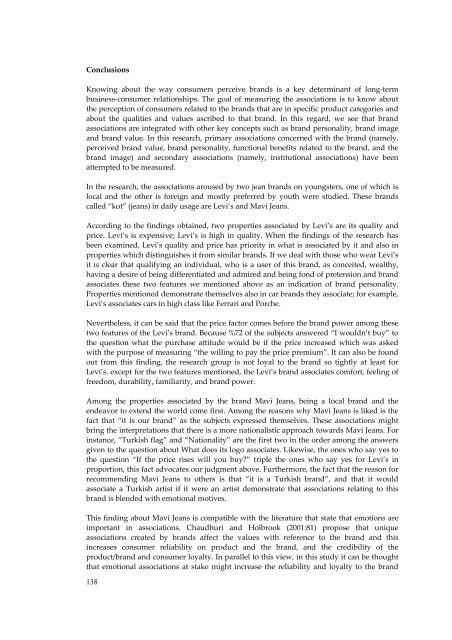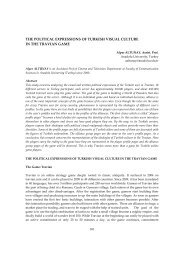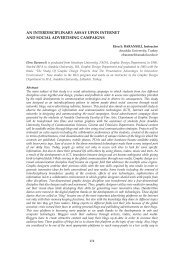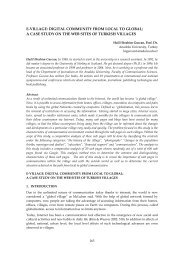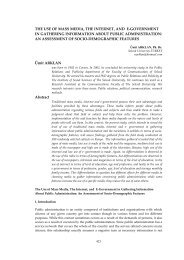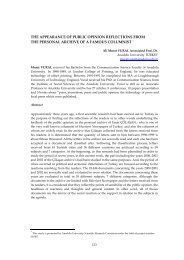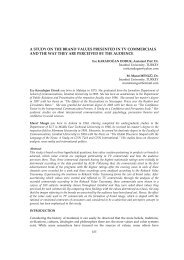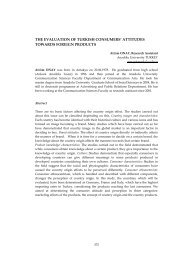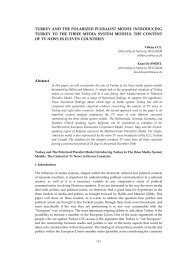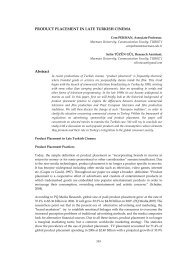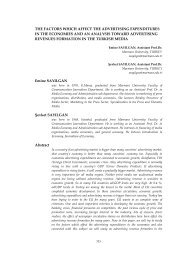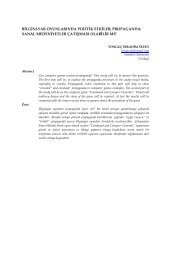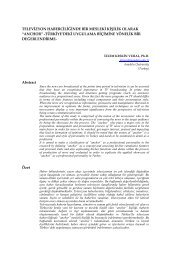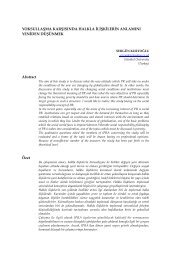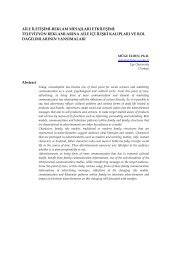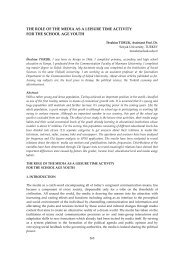THE ASSOCIATIONS OF JEAN BRANDS ON YOUNGSTERS: THE ...
THE ASSOCIATIONS OF JEAN BRANDS ON YOUNGSTERS: THE ...
THE ASSOCIATIONS OF JEAN BRANDS ON YOUNGSTERS: THE ...
You also want an ePaper? Increase the reach of your titles
YUMPU automatically turns print PDFs into web optimized ePapers that Google loves.
Conclusions<br />
Knowing about the way consumers perceive brands is a key determinant of long-term<br />
business-consumer relationships. The goal of measuring the associations is to know about<br />
the perception of consumers related to the brands that are in specific product categories and<br />
about the qualities and values ascribed to that brand. In this regard, we see that brand<br />
associations are integrated with other key concepts such as brand personality, brand image<br />
and brand value. In this research, primary associations concerned with the brand (namely,<br />
perceived brand value, brand personality, functional benefits related to the brand, and the<br />
brand image) and secondary associations (namely, institutional associations) have been<br />
attempted to be measured.<br />
In the research, the associations aroused by two jean brands on youngsters, one of which is<br />
local and the other is foreign and mostly preferred by youth were studied. These brands<br />
called “kot” (jeans) in daily usage are Levi’s and Mavi Jeans.<br />
According to the findings obtained, two properties associated by Levi’s are its quality and<br />
price. Levi’s is expensive; Levi’s is high in quality. When the findings of the research has<br />
been examined, Levi’s quality and price has priority in what is associated by it and also in<br />
properties which distinguishes it from similar brands. If we deal with those who wear Levi’s<br />
it is clear that qualifying an individual, who is a user of this brand, as conceited, wealthy,<br />
having a desire of being differentiated and admired and being fond of pretension and brand<br />
associates these two features we mentioned above as an indication of brand personality.<br />
Properties mentioned demonstrate themselves also in car brands they associate; for example,<br />
Levi’s associates cars in high class like Ferrari and Porche.<br />
Nevertheless, it can be said that the price factor comes before the brand power among these<br />
two features of the Levi’s brand. Because %72 of the subjects answered “I wouldn’t buy” to<br />
the question what the purchase attitude would be if the price increased which was asked<br />
with the purpose of measuring “the willing to pay the price premium”. It can also be found<br />
out from this finding, the research group is not loyal to the brand so tightly at least for<br />
Levi’s. except for the two features mentioned, the Levi’s brand associates comfort, feeling of<br />
freedom, durability, familiarity, and brand power.<br />
Among the properties associated by the brand Mavi Jeans, being a local brand and the<br />
endeavor to extend the world come first. Among the reasons why Mavi Jeans is liked is the<br />
fact that “it is our brand” as the subjects expressed themselves. These associations might<br />
bring the interpretations that there is a more nationalistic approach towards Mavi Jeans. For<br />
instance, “Turkish flag” and “Nationality” are the first two in the order among the answers<br />
given to the question about What does its logo associates. Likewise, the ones who say yes to<br />
the question “If the price rises will you buy?” triple the ones who say yes for Levi’s in<br />
proportion, this fact advocates our judgment above. Furthermore, the fact that the reason for<br />
recommending Mavi Jeans to others is that “it is a Turkish brand”, and that it would<br />
associate a Turkish artist if it were an artist demonstrate that associations relating to this<br />
brand is blended with emotional motives.<br />
This finding about Mavi Jeans is compatible with the literature that state that emotions are<br />
important in associations. Chaudhuri and Holbrook (2001:81) propose that unique<br />
associations created by brands affect the values with reference to the brand and this<br />
increases consumer reliability on product and the brand, and the credibility of the<br />
product/brand and consumer loyalty. In parallel to this view, in this study it can be thought<br />
that emotional associations at stake might increase the reliability and loyalty to the brand<br />
138


